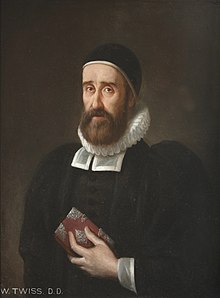William Twisse

William Twisse (1578 near Newbury, England – 20 July 1646) was a prominent English clergyman and theologian. He was named Prolocutor of the Westminster Assembly in an Ordinance dated 12 June 1643,[1] putting him at the head of the churchmen of the Commonwealth. He was described by a Scottish member, Robert Baillie, as "very good, beloved of all, and highlie esteemed; but merelie bookish."[2]
Life
[edit]Twisse's parents were German.[3] He was educated at Winchester College and New College, Oxford.[4]
He was appointed chaplain to Elizabeth of Bohemia, by her father James I of England, in 1612. This position was short-lived, and he returned to England from Heidelberg around 1613.
He was then given a living at Newton Longueville.[5] He was involved with Henry Savile in the 1618 edition of the works of Thomas Bradwardine.[6] He was vicar of Newbury from 1620.[7] There he was known as an opponent of William Laud.[8]
He died on 20 July 1646 and was buried in Westminster Abbey, but exhumed in 1661 and his remains deposited with those of dozens of other Parliamentarians in a pit in the churchyard of St Margaret's, Westminster.
Views
[edit]Twisse was a strong defender of a Calvinist, supralapsarian position.[9] In his Vindiciae gratiae of 1632 he attacked Jacobus Arminius, and in Dissertatio de scientia media of 1639 adopted certain Dominican arguments,[6] on predestination. His views were in a minority at the Westminster Assembly.[10]
A premillennialist,[11] he wrote a preface to the 1643 English translation, Key of the Revelation, of Joseph Mede's influential Clavis Apocalyptica. Mede was a friend and correspondent.[12]
Works
[edit]- A Discovery of D. Jackson's Vanity (1631) against Thomas Jackson
- Vindiciae Gratiae (Amsterdam, 1632)
- Dissertatio de scientia media tribus libris absoluta (Arnhem 1639)
- The Riches of Gods Love (1653),[13] with Henry Jeanes and John Goodwin
- An Examination of Mr. Cotton's Analysis of The Ninth Chapter of Romans[14]
- The Five Points of Grace and of Predestination[15]
- Of the Morality of the Fourth Commandment
- A Treatise of Mr. Cotton's Clearing Certaine Doubts Concerning Predestination
- The Doctrine of the Synod of Dort and Arles, Reduced to the Practice (1650)
- Of the morality of the Fourth Commandment, as still in force to binde Christians : delivered by way of answer to the translator of Doctor Prideaux his lecture, concerning the doctrine of the Sabbath (1641) OL 14032019M
See also
[edit]References
[edit]- ^ June 1643: An Ordinance for the calling of an Assembly of Learned and Godly Divines, to be consulted with by the Parliament, for the setling of the Government of the Church
- ^ Description of the Westminster Assembly – Robert Baillie. Reformation Scotland. Retrieved on 2012-07-10.
- ^ "William Twisse". Archived from the original on 28 September 2007. Retrieved 15 July 2007.
{{cite web}}: CS1 maint: bot: original URL status unknown (link). Ligonier Ministries. ligonier.org - ^ The Life and Work of William Twisse – Presbyterian Reformed Church Archived 23 October 2007 at the Wayback Machine. Presbyterianreformed.org. Retrieved on 2012-07-10.
- ^ Rectors of the Parish Church of St Faith, Newton Longville Archived 28 December 2006 at the Wayback Machine. Met.open.ac.uk (2001-01-06). Retrieved on 2012-07-10.
- ^ a b William Twisse. Scholasticon (in French).
- ^ . Dictionary of National Biography. London: Smith, Elder & Co. 1885–1900. ; [1] Archived 29 September 2007 at the Wayback Machine.
- ^ Newbury in the first of the Civil Wars in England Archived 1 March 2008 at the Wayback Machine. Newbury-society.org.uk. Retrieved on 2012-07-10.
- ^ (in Japanese) John Milton: Supralapsarians, Sublapsarians, and the Incompetence of God
- ^ Report on Justification, presented to the Seventy-third General Assembly of the Orthodox Presbyterian Church, Committee on Christian Education Orthodox Presbyterian Church, p. 71.
- ^ Reformed Theology and Premillennialism. Theologue.org. Retrieved on 2012-07-10.
- ^ Jorge Cañizares-Esguerra | AHR Forum: Entangled Histories: Borderland Historiographies in New Clothes? | The American Historical Review, 112.3. The History Cooperative. Retrieved on 2012-07-10.
- ^ William Twisse; Henry Jeanes; John Goodwin (1653) The riches of Gods love unto the vessells of mercy, consistent with his absolute hatred or reprobation of the vessells of wrath, or, An answer unto a book entituled, Gods love unto mankind ... . Oxford : Printed by L.L. and H.H.
- ^ William Twisse, A short Survey of the ninth Chapter to the Romans, so farre as it treateth of the Doctrine Of Predestination. Truecovenanter.com. Retrieved on 2012-07-10.
- ^ William Twisse, THE FIVE POINTS of Grace & of Predestination Defined and Defended Against an Arminian Remonstrant. 5solas.org. Retrieved on 2012-07-10.
Further reading
[edit]- Sarah Hutton, Thomas Jackson, Oxford Platonist, and William Twisse, Aristotelian, Journal of the History of Ideas, Vol. 39, No. 4 (Oct.-Dec., 1978)
- Vernon, E.C. (2004). "Twisse, William (1577/8–1646)". Oxford Dictionary of National Biography (online ed.). Oxford University Press. doi:10.1093/ref:odnb/27921. Retrieved 10 November 2013. (Subscription or UK public library membership required.)
External links
[edit]- 1578 births
- 1646 deaths
- People educated at Winchester College
- Westminster Divines
- 16th-century English writers
- 16th-century English male writers
- Alumni of New College, Oxford
- English Calvinist and Reformed theologians
- Supralapsarians
- 17th-century Calvinist and Reformed theologians
- 17th-century English Anglican priests
